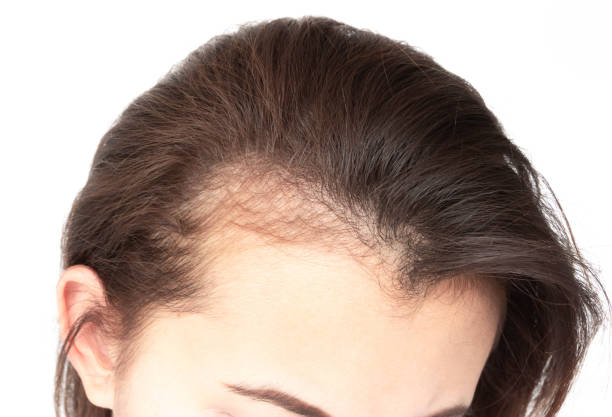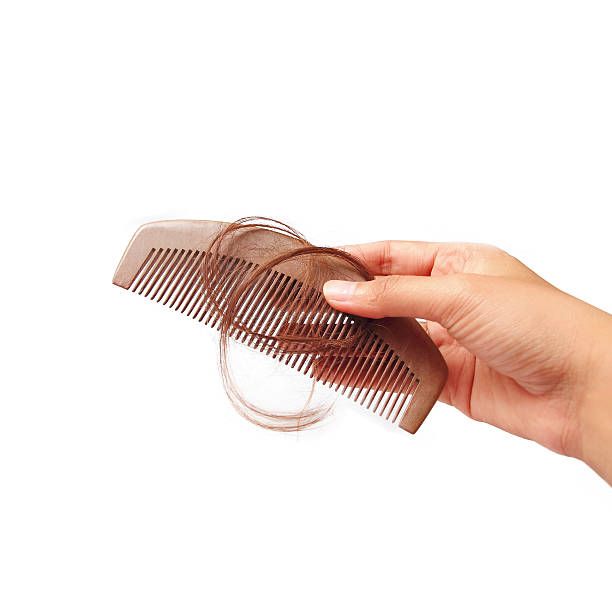I. Introduction
Hair loss affects all ages, races, and genders. Telogen Effluvium is a common cause of temporary hair loss, where hair growth cycle is disrupted leading to excessive shedding. This guide explores its causes, symptoms, and effective management strategies.
II. Understanding the Hair Growth Cycle
To comprehend Telogen Effluvium, it’s crucial to understand the natural hair growth cycle. Hair growth occurs in three phases: Anagen (change), Catagen (transitional), and Telogen (resting). Anagen is the active phase where hair grows, Catagen is the transitional phase, and Telogen is the resting phase where hair naturally sheds. Telogen Effluvium disrupts this cycle, causing an increased number of inches to enter the Telogen phase prematurely.
III. Causes of Telogen Effluvium: Exploring Triggers and Influences
Hair loss, especially Telogen Effluvium, is often a consequence of various triggers that disrupt the natural hair growth cycle. Understanding these factors is paramount in addressing and managing this condition effectively.
Physical Stressors: The Shock to Hair Follicles
Physical stressors like surgery, severe illness, or traumatic events can jolt the body’s equilibrium. This shock prompts hair follicles to enter the resting phase (Telogen) prematurely. The abrupt shift interrupts the normal growth cycle, leading to noticeable hair shedding. Individuals recovering from surgeries or dealing with prolonged illnesses often experience this type of hair loss. While the body prioritizes healing, the hair growth cycle is temporarily disrupted.
Emotional Stress: A Hidden Culprit
Emotional stress, whether arising from personal loss, chronic anxiety, or high-stress lifestyles, can wreak havoc on the body’s hormonal balance. Stress triggers the release of cortisol, a hormone associated with the body’s “fight or flight” response. Elevated cortisol levels disrupt normal hormonal rhythms, including those regulating hair growth. Consequently, hair follicles prematurely enter the resting phase, resulting in excessive shedding. Managing stress through relaxation techniques, exercise, and therapy is pivotal in preventing and mitigating Telogen Effluvium.
Nutritional Deficiencies: Fueling Hair Health
Poor diet choices, especially those lacking essential nutrients like iron, zinc, and biotin, contribute significantly to Telogen Effluvium. These nutrients are the building blocks of healthy hair. Iron deficiency, for instance, hampers the blood’s ability to carry oxygen to hair follicles, leading to weakened hair strands and increased shedding. Ensuring a balanced diet rich in proteins, vitamins, and minerals is vital in promoting robust hair growth. Supplements can complement dietary intake, especially in cases where deficiencies are identified through medical evaluation.
Hormonal Changes: The Influence of Body Transitions
Hormonal changes are natural occurrences in life, such as during pregnancy, childbirth, and menopause. These transitions profoundly affect the body’s hormonal balance, impacting the hair growth cycle. Pregnancy, for instance, causes an influx of hormones, resulting in thicker, healthier-looking hair. However, postpartum hormonal shifts can trigger Telogen Effluvium, leading to hair shedding several months after childbirth. Similarly, menopause alters hormonal levels, often causing hair thinning. Hormone replacement therapies, if pursued, must be carefully monitored to prevent excessive hair shedding.
Medications: Unintended Side Effects
Certain medications, including anticoagulants, retinoids, and antidepressants, list hair loss as a potential side effect. These drugs disrupt the normal cellular activities within hair follicles, leading to Telogen Effluvium. It’s crucial for individuals taking such medications to consult their healthcare providers. Healthcare professionals can assess the necessity of the drug, explore alternative options, or recommend mitigating strategies to counteract hair loss.
By recognizing these varied triggers, individuals can proactively address Telogen Effluvium. Seeking professional guidance, maintaining a balanced lifestyle, and being mindful of one’s emotional and physical well-being are essential steps toward healthier, fuller hair.

IV. Identifying Symptoms of Telogen Effluvium
Recognizing Telogen Effluvium involves observing specific symptoms. Excessive hair shedding, noticeable changes in hair texture, thinning spots, and emotional distress are common signs. Understanding these indicators aids in early diagnosis and intervention.
V. Diagnosing Telogen Effluvium
Consulting a healthcare professional is crucial for an accurate diagnosis. Medical evaluation, detailed history-taking, scalp analysis, and blood tests help identify underlying health conditions contributing to hair loss. A comprehensive diagnosis guides effective management strategies.
VI. Telogen Effluvium in Special Cases
Telogen Effluvium in Children
Children can also experience Telogen Effluvium due to various factors. They are identifying and addressing the root cause, whether illness or nutritional deficiency, is essential for managing hair loss in children.
Telogen Effluvium in Women
Hormonal influences play a significant role in hair loss among women. Hormone therapies, dietary adjustments, and stress management techniques are vital in managing Telogen Effluvium in women.
Telogen Effluvium in Men
Men experiencing Telogen Effluvium often face unique challenges. Understanding common triggers such as genetics and stress and exploring tailored interventions like topical treatments are vital in managing this condition.
VII. Effective Management and Treatment Options
Taking a holistic approach is paramount in managing Telogen Effluvium. Addressing underlying health issues, adopting a balanced diet, practicing stress management techniques, choosing suitable hair care products, and considering medical interventions like Platelet-Rich Plasma (PRP) therapy or hair transplantation can effectively combat hair loss.
VIII. Prevention Strategies
Preventing Telogen Effluvium involves making lifestyle changes. Maintaining a balanced diet, managing stress through regular exercise and relaxation therapies, avoiding harmful hair styling practices, and scheduling regular health check-ups are proactive steps toward preventing hair loss.
IX. Personal Stories and Experiences: Triumph Over Telogen Effluvium
Amidst the challenges posed by Telogen Effluvium, there exists a wellspring of inspiring personal stories. These narratives illuminate the path from distress to triumph, offering invaluable insights for those walking a similar journey. Real-life accounts not only provide a sense of camaraderie but also serve as beacons of hope, demonstrating that recovery is not only possible but achievable through determination and the right strategies.
Challenges Faced: The Emotional Turmoil
Hearing personal stories allows us to empathize with the emotional turmoil experienced by individuals battling Telogen Effluvium. Many recount the initial shock and distress that accompanied the realization of excessive hair shedding. Coping with the sudden change in appearance and self-esteem challenges became a common thread among these narratives. Understanding these emotional struggles helps readers relate to the personal experiences shared.
Strategies Employed: Navigating the Recovery Path
Personal stories shed light on the diverse strategies employed by individuals to manage Telogen Effluvium effectively. From dietary changes to stress management techniques, these stories highlight the proactive steps taken to address the root causes. Encouragingly, some found solace in adopting mindfulness practices, embracing a balanced diet, and seeking professional help. These strategies not only aided in managing the physical aspects of hair loss but also played a significant role in restoring emotional well-being.
Triumphs Achieved: Renewed Confidence and Self-Acceptance
The most inspiring aspect of these stories lies in the triumphs achieved. Many individuals, after implementing holistic approaches and seeking medical guidance, witnessed significant hair regrowth. These victories extend beyond mere physical changes; they signify the restoration of confidence and self-acceptance. Individuals shared how overcoming Telogen Effluvium led to newfound self-assurance, emphasizing that hair loss doesn’t define one’s worth or beauty.
Valuable Insights for Readers: Empowering Others
Personal stories serve as reservoirs of wisdom, offering practical insights and empowering advice for readers facing similar challenges. From the identification of triggers to the importance of patience during the recovery process, these experiences provide a roadmap for others to follow. The shared wisdom emphasizes the significance of self-care, self-compassion, and the importance of a support system. Readers are encouraged not only to seek professional help but also to explore holistic lifestyle changes that nurture both physical and mental well-being.
In conclusion, the personal stories and experiences of those who triumphed over Telogen Effluvium exemplify the resilience of the human spirit. Through these narratives, readers find not only solace but also a source of inspiration. The shared struggles, strategies, and triumphs illuminate a path toward recovery, reminding everyone facing Telogen Effluvium that they are not alone in their journey. By embracing the lessons from these stories, individuals can navigate their path to renewal, confidence, and, ultimately, triumph over hair loss.
X. Conclusion: Empowering Hair Health
In conclusion, understanding Telogen Effluvium empowers individuals to take control of their hair health. By recognizing the causes, symptoms, and effective management strategies, one can proactively address hair loss concerns. Seeking professional guidance, adopting healthy lifestyle practices, and staying informed are vital steps in overcoming Telogen Effluvium.
XI. FAQs
1-Can Telogen Effluvium be Permanent?
Telogen_Effluvium is usually temporary and reversible once the underlying cause is addressed.It is crucial to seek advice from a healthcare expert for accurate diagnosis and effective treatment.
2-Are There Natural Remedies for Telogen Effluvium?
While maintaining a balanced diet and managing stress can aid in hair health, it’s crucial to consult a healthcare provider for personalized guidance. Natural remedies should complement, not replace, professional advice.
3-Is Telogen Effluvium Hereditary?
While genetic factors can influence hair loss, Telogen_Effluvium is primarily triggered by external factors like stress, illness, or medications. Individuals with a family history of hair loss should remain vigilant and adopt preventive measures.
4-Can Telogen Effluvium Be Caused by Sudden Weight Loss?
Yes, rapid weight loss, especially crash diets, can cause Telogen_Effluvium. It’s essential to maintain a healthy and gradual weight loss plan to minimize the risk of hair shedding.
5-How Long Does it Take for Hair to Regrow After Telogen Effluvium?
Hair regrowth varies depending on the cause. It usually takes a few months to a year with proper management and trigger addressing.
6-What Are the Early Signs of Telogen Effluvium?
Recognizing the initial signs of Telogen_Effluvium is crucial for timely intervention. Understanding these signs can empower individuals to seek help and manage the condition effectively.
7-Can Telogen Effluvium be a Symptom of an Underlying Health Condition?
Sometimes, Telogen_Effluvium can be a manifestation of an underlying health issue. Are there specific health conditions that are commonly associated with this type of hair loss?
8-Is Telogen Effluvium More Common in Certain Age Groups?
Does age play a role in the prevalence of Telogen_Effluvium? Are there specific age groups that are more susceptible to experiencing this condition?
9-Are There Special Shampoos or Hair Products That Can Help with Telogen Effluvium?
Many individuals turn to specialized hair care products for managing hair loss. Are there specific shampoos, conditioners, or treatments designed to address Telogen_Effluvium?
10-Can Telogen Effluvium Impact Body Hair or Just Scalp Hair?
Does Telogen Effluvium affect all body hair, or is it limited to the scalp? Understanding the extent of hair loss can provide a clearer picture for individuals concerned about their condition.
In navigating the complexities of Telogen Effluvium, knowledge is the most potent tool. Armed with understanding and proactive measures, individuals can embrace healthier hair and renewed confidence.
Read also.. Hair Breakage: Unraveling the Causes and Strengthening Solutions

